FIBER OPTIC CABLE
Our company supplies fiber optic cables from manufacturers specializing in providing high-quality products.
We warmly welcome you to wholesale high quality fiber optic cable at a competitive price.
The development of telecommunication networks around the world is primarily based on the use of fiber-optic communication lines (FOCL).
Fiber-optic cable (FOC), which is based on optical fibers, is currently considered the most advanced guiding system for both long-range telecommunications highways and local data transmission networks. This is explained by the fact that fiber-optic cables are significantly superior in their characteristics to electric cables.
The ADVANTAGES of fiber-optic communication lines (FOCL) in comparison with lines built on electric communication cables are as follows:
- The wide bandwidth of the cable (up to hundreds of GHz) allows you to get a significantly larger number of channels and paths for various purposes on one optical fibers — the bandwidth on one optical fibers is possible up to tens of Gbit/s.
- The small value of the attenuation coefficient of optical fibers (up to tenths of dB/km) makes it possible to increase the length of the relay section to hundreds of kilometers.
- The small overall dimensions and weight of the FOK facilitate their production and installation.
- Continuous and continuous improvement of the production technology of FOK ensures a reduction in their cost. Currently, the cost of quartz optical fiber does not exceed half the cost of a copper pair.
- The absence of external electromagnetic influences and transient interference between the FOK fibers improves the quality and reliability of information transmission.
- The practical absence of external electromagnetic radiation ensures high secrecy of communication, i.e. protection from unauthorized access.
- Continuous improvement of the (ВОСП) as new sources of optical radiation, optical fibers, photodetectors and optical amplifiers with improved characteristics become available makes it possible to increase the bandwidth of existing paths.
- Full electrical insulation (optical fiber dielectric) ensures safe operation in explosive environments. Consequently, the safety conditions during construction and operation are improved FOCL.
- The absence of non-ferrous metals in the design of the FOC.
Some disadvantage of modern FOCL is the high cost of interface and installation equipment. However, improving the design and reliability of optical transmitters, receivers and passive elements of the linear path make it possible to constantly reduce the cost of manufacturing fiber-optic products, and improving the technology of installation of FOC and connecting elements, as well as simplifying the equipment used, lead to a significant reduction in the complexity of construction and installation work.
Contact us to get more information.

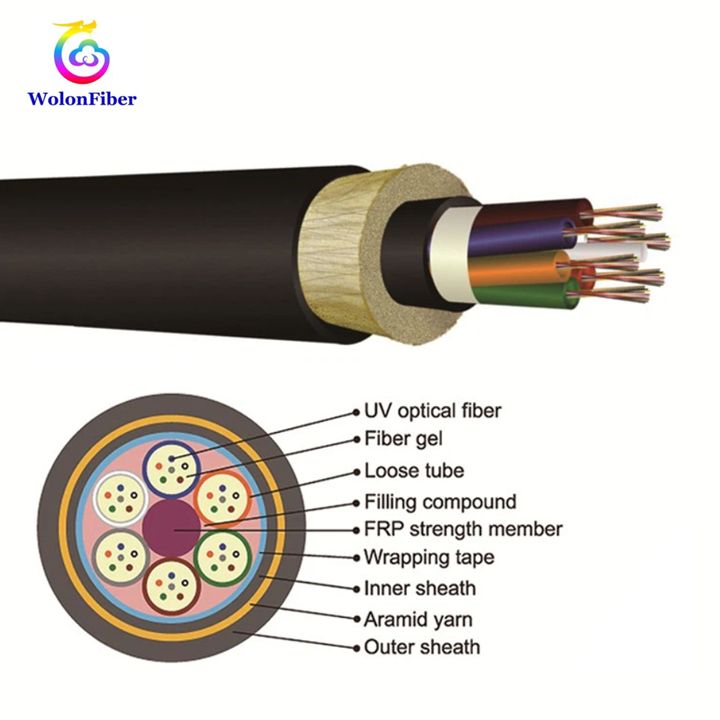
Fiber optic cable Adss
Description:
The ADSS cable has a free tubular structure, an optical fiber in a pine shell made of high-modulus polyester material, a pine shell with a waterproof shell filler (and a filling line) around a non-metallic center (FRP) to strengthen the core twisted into a compact core, the core inside a gap filled with a gel core, an external extrusion polyethylene (PE) with the inner shell, and then strengthen the bidirectional function of aramid yarn twisted around two layers, finally, extrusion polyethylene (PE) coating or electrical erosion resistance (AT) of your coating.
The ADSS fiber optic cable is an inexpensive high-capacity fiber optic cable that is highly resistant to electromagnetic interference, accidental damage and environmental influences, making it suitable for high—speed long-range data transmission.
ADSS fiber optic cable is mainly used in wireless radio communications, telecommunications, network transmission and broadband access, which allows you to provide broadband services, high-speed data transmission and high-definition video transmission.
1. Low cost.
2. High throughput.
3. Powerful protection against electromagnetic interference.
4. Reliable protection against accidental damage and environmental impact.
This makes it an ideal medium for broadband transmission.
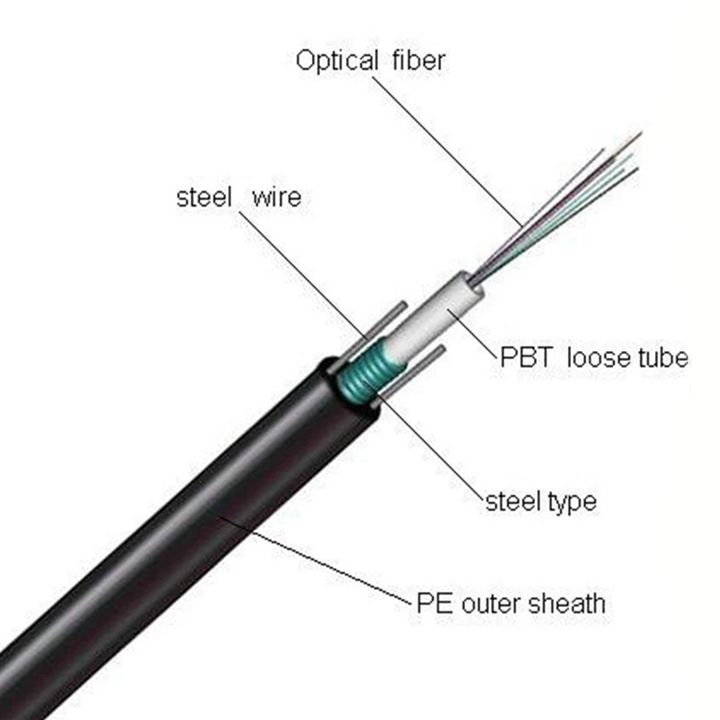
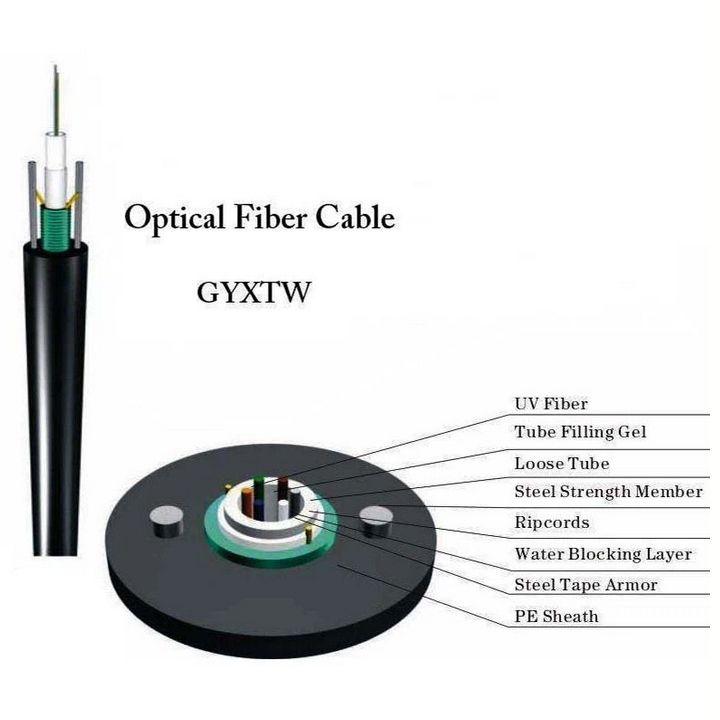
GYXTW Outdoor Fiber Optic Cable with Free Tube
Description:
Fibers with a diameter of 250 microns are located in a free tube made of high-modulus plastic. The tubes are filled with a waterproof filler. The tube is wrapped with a layer of corrugated steel tape in the longitudinal direction. Between the corrugations. steel tape and water-blocking material of the free tube are used to keep the cable compact and waterproof. Two parallel steel wires are placed on both sides of the steel strip. The cable is equipped with a polyethylene sheath.
Specifications:
· Good mechanical and temperature characteristics
· High-strength loose tube, resistant to hydrolysis
· A special tube filling compound provides critical fiber protection
· Crush resistance and flexibility
· Two parallel steel wires provide tensile strength
· Small diameter, light weight and convenient installation
FTTH branch cables are used to connect subscribers by connecting an optical distribution point to an optical telecommunications outlet. Depending on the application, these optical cables are divided into three main categories: outdoor, indoor and outdoor-indoor.
- Network access
- Use end-user direct wiring
- internal wiring and FTTH distribution
- FTTH
- Office building
- Computer room, cable TV, cable TV
- Indoor and outdoor
- Intercity and local trunk lines
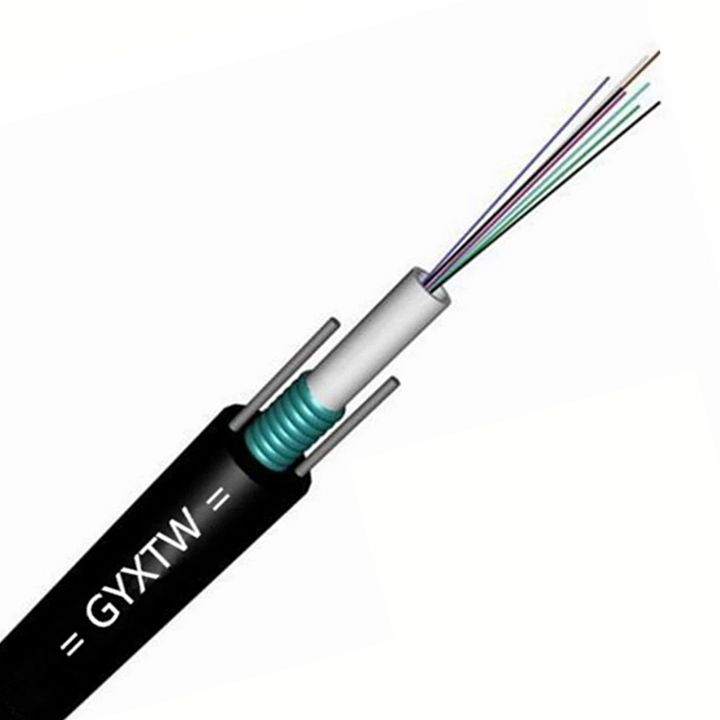
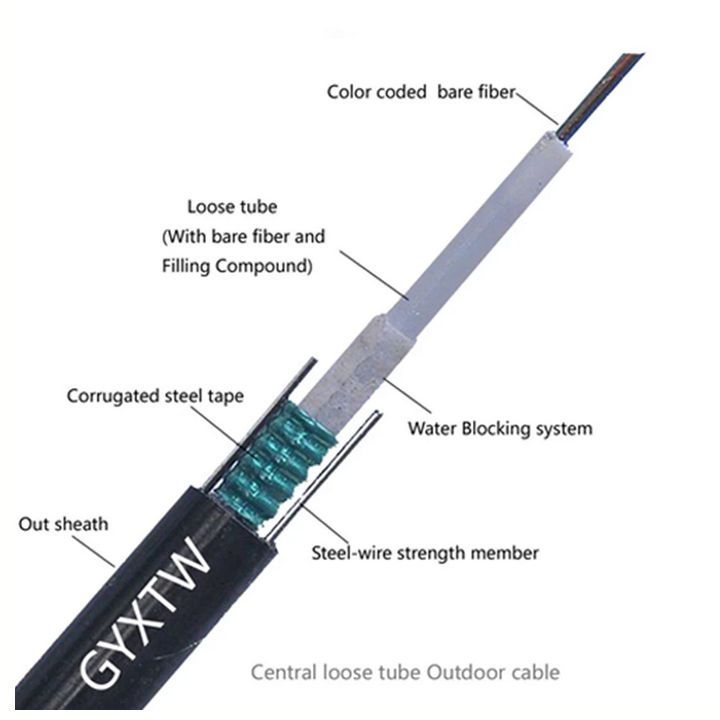
Ftth Drop Cable
Description:
Fibers with a diameter of 250 microns are located in a free tube made of high-modulus plastic. The tubes are filled with a waterproof filler. The tube is wrapped with a layer of corrugated steel tape in the longitudinal direction. Between the corrugations. steel tape and water-blocking material of the free tube are used to preserve the compactness of the cable and water resistance. Two parallel steel wires are placed on both sides of the steel strip. The cable is equipped with a polyethylene sheath.
Feature:
· Good mechanical and temperature characteristics
· High-strength loose tube, resistant to hydrolysis
· A special composition for filling pipes provides critical fiber protection
· Crush resistance and flexibility
· Two parallel steel wires provide tensile strength
· Small diameter, light weight and easy installation
The leather cable is commonly known as the internal hanging cable.
The FTTH branch cable contains from 1 to 4 color single-mode optical fibers with 250 microns individually, which provides a good solution for fiber to the house in the last mile.
The cable contains two durable fiber reinforced plastic (FRP) elements and a Low Smoke Zero Halogen (LSZH) shell with a nominal size of 2 x 3 mm.
They fully comply with RoHS standards.
Due to its small diameter, light weight and special structure, it is easy to use, handle and pull fibers from cables.
This is an ideal option for direct installation in homes.
A special bend-resistant optical fiber provides greater bandwidth and improves network transmission performance;
Two parallel elements made of FRP or metal make the optical cable well compressible and protect the optical fiber;
The optical cable has a simple structure, light weight and practicality;
Unique groove design, easy to detach, convenient to connect, simplifies installation and maintenance;
Shell made of low-smoke halogen-free flame-resistant polyethylene or fire-resistant PVC shell, environmental protection.
It can be combined with various field connectors and can be connected on site.
Leather cable is widely used in access networks because of its softness and lightness; scientific name of leather cable: butterfly-shaped input cable for access network; because its shape is in the shape of a butterfly; therefore, it is also called butterfly cable, optical cable.
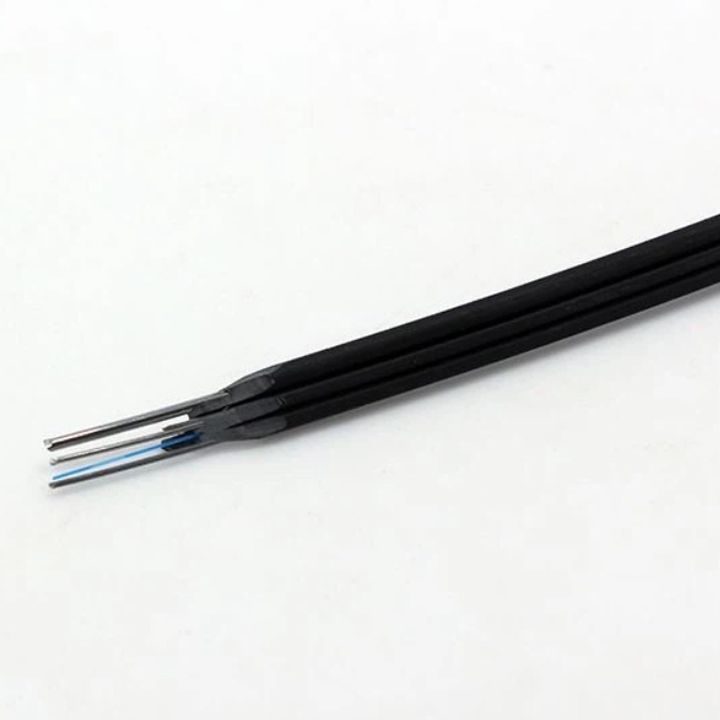
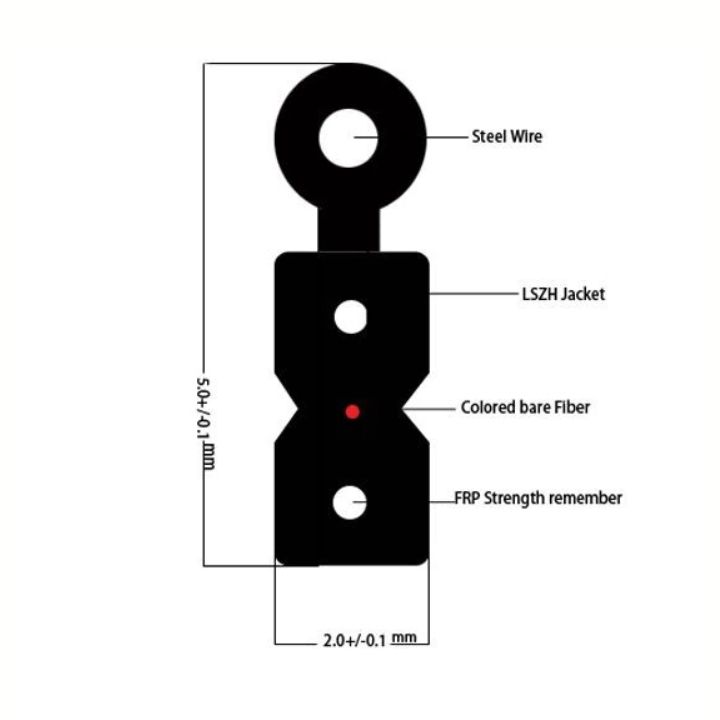
GJYXFCH Antenna Cable
Description:
Type:Outdoor Fiber Optic Cable
Place of Origin: Jiangsu, China
Brand name:WOLON
Number of conductors: greater than or equal to 10
Product Name: fiber optic cable
Number of fibers: 1-144 cores
Jacket Color: Black
Application: Outdoor antenna
The FTTH self-supporting branch cable consists of one or two single-mode fibers (G.657A). The cable is protected by a dielectric strength element made of fiberglass reinforced plastic (FRP), steel wire and PE/LSZH outer shell. Designed for outdoor installation, the cable is well suited for connecting the dome to a small living room/warehouse and individual villas.
Specifications:
- Self-supporting structure, light weight, easy to install.
- A special fiber with low bending sensitivity provides high throughput and excellent data transmission properties.
- The steel wire as an additional force element has a high tensile strength.
- Two parallel FRP force elements provide good crushing resistance to protect the fiber.
- Simple design, light weight and high practicality.
- The number of fibers is 1-12 cores, other fibers may be available on request.
- New groove design, easy to clean and glue, simplifies installation and maintenance.
- Durable and fire-resistant LSZH shell, low-smoke, halogen-free.
- Used in FTTH projects
- High-speed optical routes in the building
- High-performance optical network
A high-bandwidth FTTH network gives you the opportunity to gain a competitive advantage and maintain an environmentally sustainable network that consumes less energy. FTTH self-supporting branch cable with simple design and low weight is highly recommended for connecting external and internal cables.

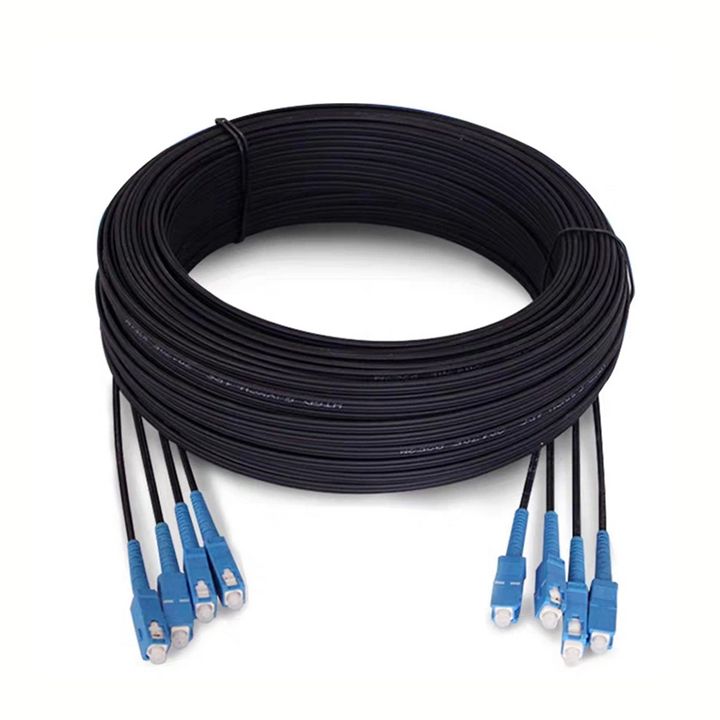
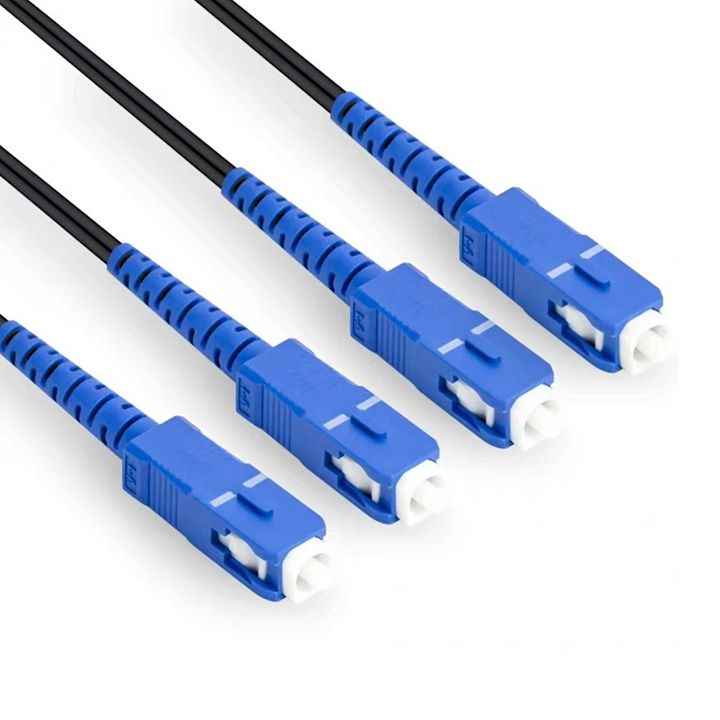
Apc Folding Cable
Description:
The branch cable is a special fiber optic cable for the home (FTTH), especially suitable for the internal wiring of the pipeline, gutter and various radiation application conditions. There are internal type, erial type and pipe type for various applications.
FTTH fiber optic branch cables are a good choice for fiber to home solutions, they have a small diameter and light weight, save space well and are easy to install.
The fiber optic cable has a special structure, so the fibers are easy to pull out of the cables, FTTH branch cables are ideal for direct laying in homes, suitable for use in homes and offices.
Specifications:
1. Compact portable design, convenient for internal wiring.
2. Excellent resistance to side pressure protection design.
3. Soft, flexible, easy to fit and highly practical.
4. Environmental protection. Low-smoke, alogene-free and flame retardant shell.
The branch cable is also called a "transceiver cable". More generally, a branch cable is any short cable connecting a computer's network card to a wall panel. The pull-out cables will allow computers to easily disconnect and reconnect to the network so that you can move them around the room.
Branch cables are ideal for on-premises data centers, local area networks (LAN), indoor areas, highways, levels, risers, plenums, conduits, junction boxes, patch panels and industrial applications.
Distribution cables for indoor, indoor and outdoor applications, mains inside and between buildings, switchboards, electrical wiring between telecommunication rooms and connecting cables in risers and halls, horizontal distribution for FTTD, EDA zones of the data processing center and automation of factory workshops.
Since it is used outdoors, according to the industry standard, the branch cable must have a minimum tension force of 1335 Newtons. Fiber optic branch cables are available in many different types. The three most commonly used fiber optic cables include a flat branch cable, a curly-8 air branch cable and a round branch cable.

Send a request

© 2023 "SPECTR İNŞAAT TİCARET LİMİTED ŞİRKETİ"


